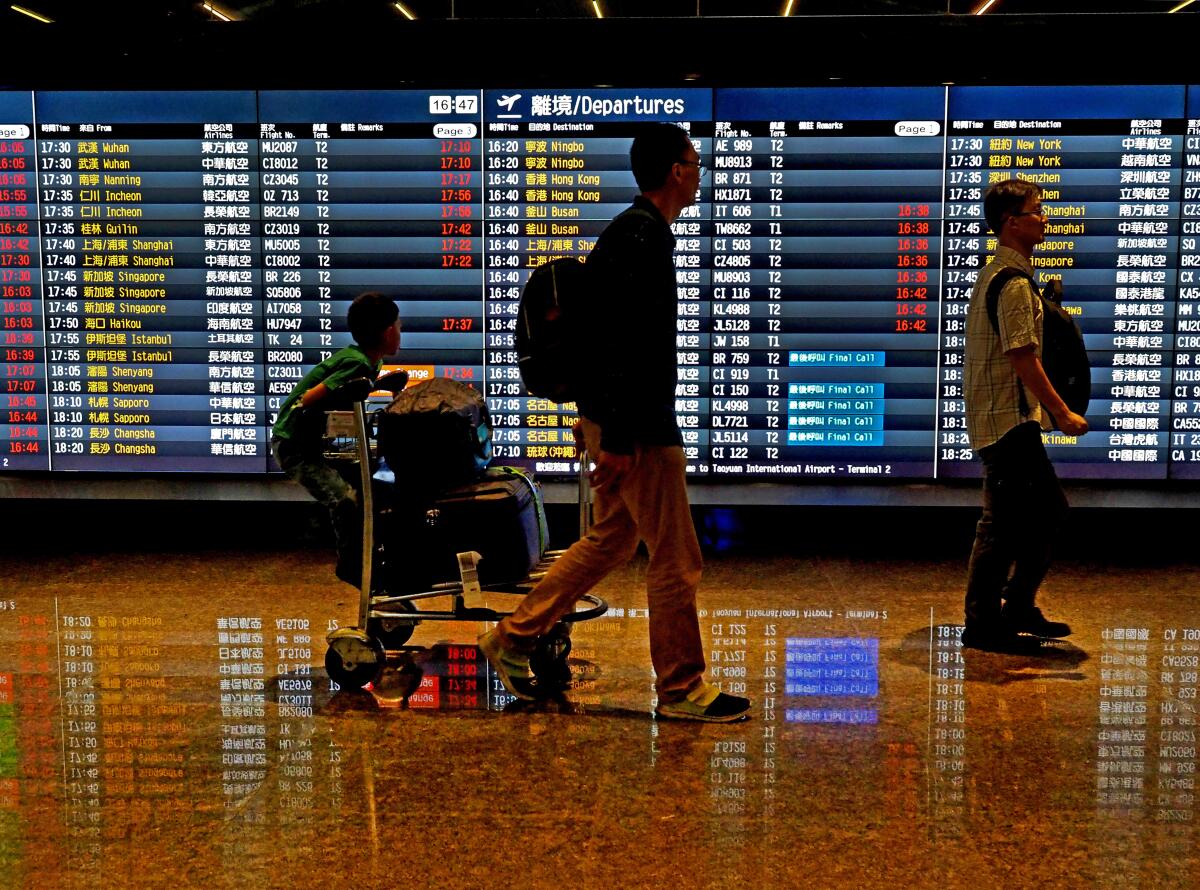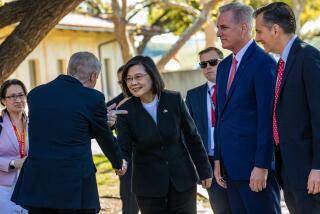China suspends independent travel by tourists to Taiwan

- Share via
TAIPEI, Taiwan — The governments of China and Taiwan don’t talk. But more than 80,000 Chinese tourists visit Taiwan each month for an alternate take on Chinese culture, making friends and stoking business, often in parts of the nearby island that other tourists usually miss.
Citing “current mainland-Taiwan relations,” Beijing’s Ministry of Culture and Tourism announced that beginning Thursday, independent tourists will no longer be granted permits to visit the island.
The indefinite suspension is likely to prove a major economic hit to Taiwan, as well as a blow to cultural interplay.
“They can get a deep understanding of Taiwan’s culture and lifestyle and broaden horizons –- an important channel for knowing Taiwan,” the Taiwan government’s Mainland Affairs Council said in a statement Wednesday. “The council expresses deep regret toward the mainland’s suspension of independent travel on its own and limits on contact between our peoples.”
Independent Chinese tourism to Taiwan has already been shrinking, as tensions have mounted between the mainland and Taiwan, which has been self-ruled since the Chinese civil war of the 1940s.
China has firmly insisted that Taiwan merge with the mainland despite opinion surveys conducted by the Taiwanese government that show more than 80% of islanders prefer autonomy.
Between 2008 and 2016, the two sides opened a strong dialogue that led to more than 20 agreements, including one in 2008 that opened Taiwan to mainland tourists.
In 2015 and 2016 more than 1.3-million mainlanders visited, according to Taiwan’s National Immigration Agency. But in 2017, as political initiatives frayed, independent travel declined to just over 1 million, and fell further last year to 978,000.
Group tourism also fell in 2016 by 18% as Chinese officials urged domestic travel agencies to begin steering group tours elsewhere.
Chinese tourists miffed by the suspension say their Taiwan travels left them with strong, mostly upbeat impressions while satisfying a curiosity they had felt since reading about Taiwan as children.
“I think it’s about strong cultural and deep historic connection across the [Taiwan Strait],” said Wang Tong, 37, a university employee who visited twice and hopes the suspension is brief. “Most Chinese in my generation grow up with many Taiwanese novels, drama, variety shows and songs.”
When Laura Lu visited in 2016, she went hiking in the blustery mountains of Yangmingshan National Park north of Taipei and got lost in a rainstorm. A Taipei taxi driver put her back on the right path and referred her to a local friend who became her guide. That encounter cemented the 49-year-old’s overall impression of Taiwan.
“Taipei people are really good, polite and courteous,” the private jet rental agent from Shanghai said. Strangers in China can be gruffer, she said, even putting a hand in the faces of inquiring strangers. In Taiwan, she says, “You ask other people where to go and they always tell you.”
Tourism bureau surveys in 2015 found 73% of self-guided tourists were “extremely satisfied” with Taiwan.
Independent Chinese travelers have been visiting Taiwan from 47 mainland cities –- as agreed by both sides -- on flights of no more than two or three hours. Adding convenience, their native language Chinese appears on signs throughout Taiwan and almost everyone on the island speaks it.
“I don’t think the people from either side have any problems getting on,” said Weng Yunchun, 44, a Beijing-based organic farmer who visited Taiwan in 2017. “It was like traveling to other cities in mainland China.”
Some tourists blog about their favorite restaurants, enticing more business. A Chinese blogger made one Taipei noodle bowl restaurant so popular that by 2017, diners stood outside clutching their bowls and plastic spoons for lack of enough seating.
Travelers also revel in religious, architectural and cultural similarities, the result of migration from China to Taiwan that began hundreds of years ago, with its most recent wave in the 1940s. Travelers also take home new information from Taiwan’s newspapers, news websites and television channels, all free of censorship unlike on the mainland.
Politics began disrupting relations in 2016 after Tsai Ing-wen became president of Taiwan. Like much of the public, Tsai rejects Beijing’s goal of unification as well as its premise that both sides belong to a single China. Her predecessor from 2008 to 2016 had accepted the condition.
The mainland government answered Tsai by flying military aircraft near Taiwan and enticing Taiwan’s diplomatic allies to drop relations and recognize Beijing instead. Beijing also thinned the number of group tours to the island.
A prolonged suspension of independent travel will cost Taiwan a portion of the 2.2% growth expected this year in its $589-billion GDP, as the service sector founders, said Liang Kuo-yuan, president of Taipei-based think tank Polaris Research Institute.
“Mainland China was motivated by wanting to show that ‘in addition to military threats we can actually use the economy as resistance,’” Liang said.
State-run China Central Television said on its Weibo social media website Wednesday that independent travel permits had paused because “risks are increasing” for travelers as Taiwan’s January 2020 elections approach. Tsai is due to run against a China-friendly populist mayor.
“It’s said that tourism numbers will drop by 7-800,000,” the Weibo account stated. “Taiwanese tourism industry, are you guys still OK?”
Chinese tourists “should be allowed to join more & more travelers from around the world in experiencing a country where freedom, openness & tolerance are the order of the day,” Foreign Minister Joseph Wu retorted in a tweet. “What’s to fear?”
Times Beijing correspondent Alice Su contributed to this report. Jennings is a special correspondent based in Taipei.
More to Read
Sign up for Essential California
The most important California stories and recommendations in your inbox every morning.
You may occasionally receive promotional content from the Los Angeles Times.













